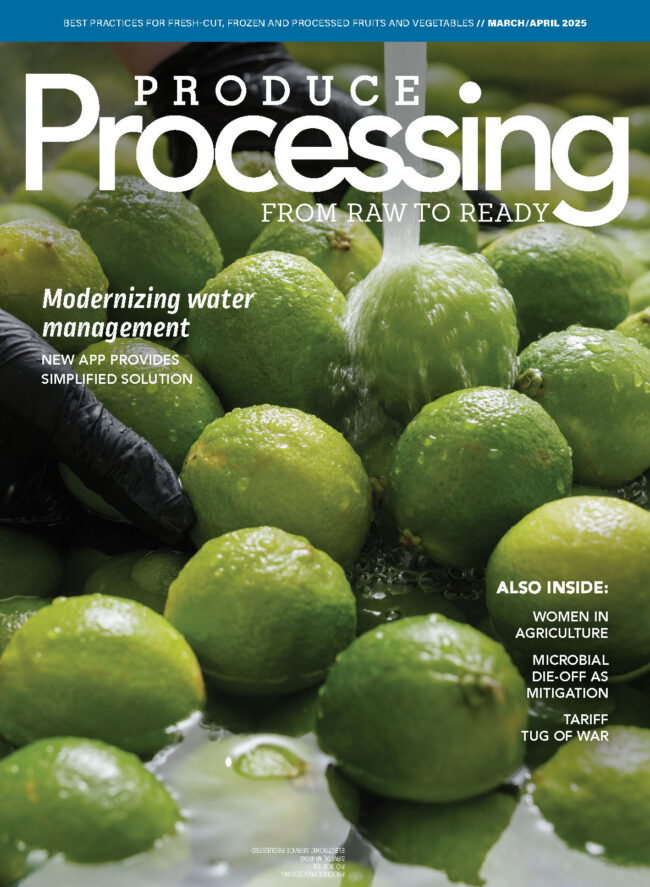Succeeding in Niche Markets
Companies are always looking for underserved markets, and Del Monte Fresh is carving outs its own niche in fresh-cut convenience snacking. The company’s new line of fresh-cut products and individually packaged bananas for vending machines was featured in the January issue of Fresh Cut, but Dennis Christou, vice president of marketing for Fresh Del Monte Produce, provided attendees of the Fresh-Cut Super Session at United Fresh Las Vegas with some tips for how to be successful in new market opportunities.
Fresh Del Monte looked to the vending marketing as a way to expand its business because 12 percent of disposable income is spent on food, and food bought away from home is almost even with the amount spent on food at home, with 41 percent spent in foodservice restaurants, 37 percent at limited service restaurants, 6 percent at schools and colleges and 5 percent at convenience stores, bars and vending machines.
It’s that last category Fresh Del Monte is expanding into. Vending is a $23-25 billion industry with more than 200,000 machines in the United States. It’s a highly fragmented industry, Christou said, where 75 percent of the operators are small, with sales annually less than $1 million. They’re generally entrepreneurial mom and pop operators, but the industry as a whole is facing heat due to health issues. The top snacks, in order, are Snickers bars, Doritos, Peanut M&M’s and Cheetos.
“There’s definitely some space for healthy snacks in there,” Christou said.
But there are barriers to entering the market, especially for a fresh and fresh-cut produce distributor. First, the snack food industry is well-entrenched in the industry and operators are under contract. Vending machine locations also are fragmented, and operators don’t have a cold chain supply chain that would maintain the quality of fresh-cut items. They also don’t have experience in handling fresh produce or shorter shelf-life items. The prime locations, particularly at schools, have high location fees that support school programs, and the vending machines themselves have a high unit cost, Christou said.
Fresh Del Monte has a little more than six months of experience in the vending industry, but that was preceded by two years of research and planning. The company spent about 18 months in research and development and planning, which included developing single-serving packages for bananas, packaging and sizing for fresh-cut products and vending machines with dual-zone temperatures for bananas and fresh-cut fruit and vegetables. Fresh Del Monte then spent about six months field testing 10 machines to determine pricing and consumer perceptions. The products and their packaging had to be designed from scratch to work with the handling techniques of vending machines and operators, including the modified atmosphere bags for the bananas.
Roll-out of the machines was staged by Fresh Del Monte’s marketing department to get attention in the vending industry. The machine was introduced at an industry association conference, where it was the star of the trade show. The company has focused on educational institutions for the initial launch, and is heavily invested in marketing and public relations, Christou said.
In the months since the introduction of the vending machines with fresh and fresh-cut produce, Fresh Del Monte has learned some keys to success. The first is in pricing. Price isn’t an issue for most people buying from vending machines, Christou said, so as long as the bananas are comparable in price to a candy bar then people will buy. Fresh-cut items, which have a higher cost, have to be comparable in price to meal alternatives like sandwiches, he said. The company also has seen sales differ across locations. High school vending machines usually have higher fresh-cut vegetable sales, middle schools sell more fresh-cut fruit items and vending machines near exercise locations sell more bananas, Christou said.
Fresh Del Monte has learned a lot about selling fresh-cuts in vending machines in a short amount of time, Christou said. To be successful in this new business channel, he has a number of recommendations.
First, a processor has to have an extensive and flexible logistics network. Fresh Del Monte has 28 facilities in North America that handle anything from packing and sorting to processing and shipping. The company also has a trucking division, so vending machine operators can get deliveries from regional processors, or they can pick up drop shipments with their own delivery vehicles. As a large distributor, Fresh Del Monte had to adapt to work with small, fragmented owner-operators to keep machines stocked as well as maintain quality and freshness.
Second, Christou said processors hoping to get into the vending industry should invest in innovative packaging capabilities. Vending machines don’t have the best temperature controls and the air circulation in the machines isn’t ideal, he said, so the product packaging had to be designed for the channel. The products, depending on where they are in the vending machine, may have to fall several feet, so product packaging has to physically protect the products, too.
Third, have a best-in-class food safety system. That’s especially important when dealing with food distribution in schools, Christou said.
Fourth, have public relations and marketing resources on hand. Not only is communication with the produce and vending industries and the general media important, but so is communication school districts, parents, children and the vending operators. This covers everything from proper handling and storage to the health benefits of fresh produce compared to other items.
There’s room to grow the sales of fresh-cut fruits and vegetables in the vending industry, especially as the public are increasingly starved for time and healthful food options. And as schools continue to eliminate junk food and sugary snacks from school grounds, Fresh Del Monte may be on the leading edge of a future trend in produce sales through vending machines.










